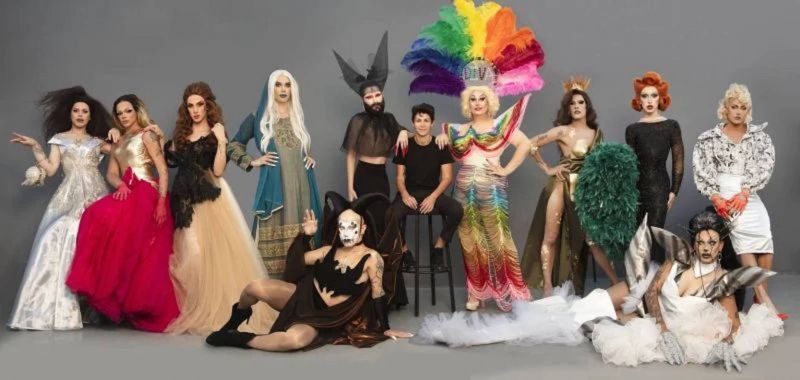
(Credit: Tarek Moukaddem)
I don’t recognize Lebanon anymore. Far from romanticizing its imperfect past, I am desperately clinging to an image that once was but is no more. Day after day, that image becomes a distant history, an illusion.
This is a country that was once dubbed a beacon of political and social freedoms in the Arab world and has now turned into a dark and bottomless abyss, where death triumphs over life, religious bigotry rapes individual rights, freedom of expression is muzzled and sexual identity is persecuted because it is deemed “a threat to society.” Meanwhile, criminals roam freely, international fugitives are turned into heroes and human life has no value.
Lebanon’s LGBTQ+ community is recently facing a dangerous nationwide hate campaign led by Hezbollah’s leader Hassan Nasrallah, who explicitly incited violence against gays and lesbians and called for them to be killed. Other religious leaders, politicians and far-right Christian groups have also joined in reiterating the homophobic rhetoric prevalent in the Arab world. On Wednesday night, a bar in Beirut hosting a drag queen show was attacked by so-called “Soldiers of God,” a far-right Christian militia. The incident sounds the alarm in a community increasingly vulnerable with no protection whatsoever. But this attack is not the first. Homosexuality is still criminalized in Lebanon to this day. For years now, the community has been persecuted. Ministers have banned LGBTQ+ gatherings and protests, the police have cracked down on LGBTQ+ events and detained individuals accused of homosexuality. Last week, Sunni MP Ashraf Riffi tabled a bill to widen the scope of this repression by criminalizing “anything that propagates homosexuality and sexual deviance,” while a few days earlier, nine of his colleagues tabled another bill to abolish article 534 of the penal code, which criminalizes any so-called “unnatural” relationship.
Most Lebanese remain silent and complacent in the face of this oppression. They seem indifferent and not concerned, failing to see that a crackdown on LGBTQ+ people is a crackdown on individual freedoms, a crackdown on human rights and all Lebanese citizens’ aspiration to live a life of their choosing. If they allow this crackdown to happen then they are allowing others to dictate and impose restrictions upon their way of life. It’s the LGBTQ+ community today, but it will be someone else tomorrow. They also fail to reckon that the LGBTQ+ community is not a problem but a diversion of the discourse by the politicians of the country to distract their constituents from the real issues: a collapsed country. The LGBTQ+ community does not hold a weapons arsenal outside state jurisdiction. It does not store ammonium nitrate in a functioning port causing half of Beirut to blow up. It does not scheme to fund corruption. It has not made them poor or hungry. It has not taken their job away from them.
Lebanon is drowning in an unprecedented economic crisis, described as one of the worst since the 19th century. Some Lebanese, instead of going after those responsible of their plight, are outraged by gays and lesbians, and adamant to fight their existence but happy to live among the thieves and criminals who are responsible for both the economic crisis and the Beirut explosion and have not been held accountable to this day. We need to fight the mediocrity of the political and populist rhetoric that is trying to dilute the real issues we are facing.
For many years as a journalist in Lebanon, I worked with the LGBTQ+ community getting to know many of its members, some of whom I proudly call my friends today. They have touched me with their painful stories but also emboldened me with their courage. Lebanon’s drag queens are part of an underground movement fighting through art. They have formed a resistance movement behind closed doors using standup comedy, dance and music to relay a message: their right to exist. They have made me laugh and amazed me with their bold and flamboyant performances but they live in constant fear of a police raid, the fear of being arrested and tortured. They are denied the right to be and right to live.
We are all born equal and should be treated as such. We can’t keep ostracizing and criminalizing others because they are different and because their difference makes us uncomfortable and pushes our socially-constructed boundaries.
To the LGBTQ+ community of Lebanon and the Arab world, to Sandra, Diva, Hoedy, Latiza, Melanie, Zuhal and the others: I know you are scared today, but your stamina gives us hope. You are color and life. Don’t let anyone tell you otherwise. Stay safe. Stay brave.
Dalal MAWAD is an award-winning Lebanese journalist based in Paris. She’s the author of “All She Lost. The Explosion in Lebanon, the Collapse of a Nation and the Women Who Survive” (Bloomsbury, 2023)
This opinion originally ran in French in L’Orient-Le Jour.